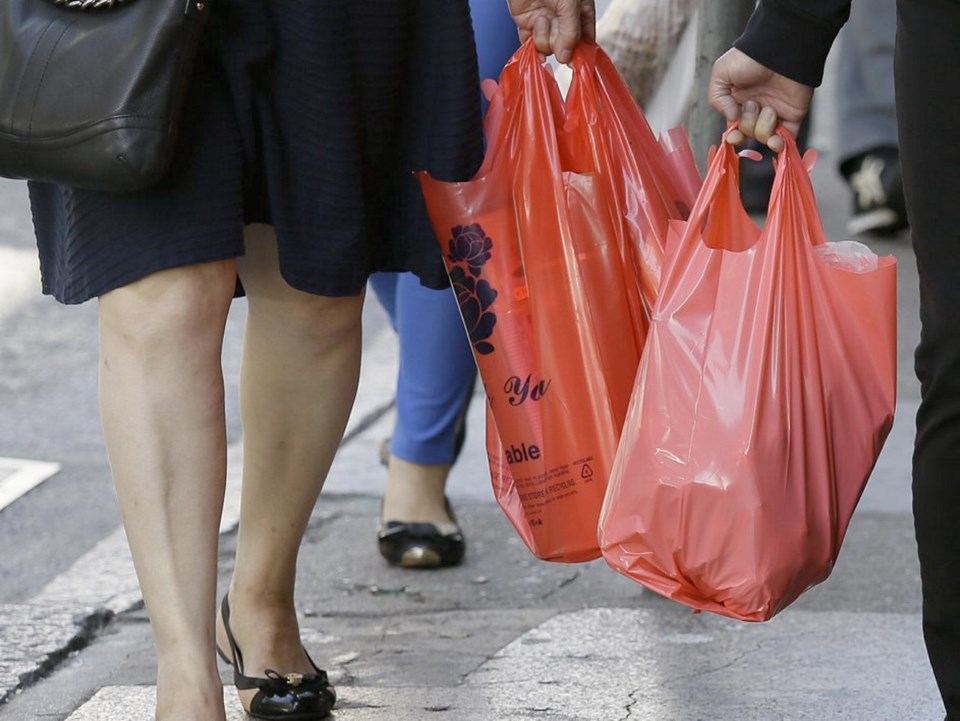Victorians will have an opportunity to weigh in this week as city staff complete plans to ban single-use plastic checkout bags.
Victoria council has made it clear that it wants to see a ban, says director of engineering Fraser Work. Key will be introducing a bylaw that, through the proper application of carrots and sticks, avoids unintended consequences.
“What we don’t want to see is a couple of things. One would be a replacement of each one of those plastic bags with paper bags because the environmental impacts of that are actually greater than the plastic bags,” Work said.
“And we don’t want to see a rebound toward an excess of reusable bags that are much more resource intensive.”
A public meeting will be held at Victoria City Hall on Wednesday in advance of the planned introduction next week of a proposed bylaw governing single-use bags.
Work hopes the takeaway will be positive — that “reusable bags are best,” not that a ban is inconvenient.
The bylaw will have to provide sufficient time for businesses to adjust, including working through existing inventories of single-use bags and designing new inventories of reusable checkout bags.
“If plastic bags are going to be banned and if that’s what council wants to do, then businesses and other different stakeholders need time to adjust. So the timeline for the adjustment period has to be something that’s reasonable. So that’s another key element,” Work said.
The proposed bylaw is still being drafted, so Work said that he was reluctant to go into details of what will be proposed.
While some favour levying small fees of 10 cents a bag to reduce their use, and then moving to a ban, it can become confusing for the customers, Work said.
“You have to manage those trade-offs quite carefully,” he said.
Momentum for bylaws restricting the use of plastic bags has been steadily growing in recent years.
At Victoria’s instigation, the Capital Regional District recently distributed to member municipalities a model bylaw banning plastic bags that can be used as a template in crafting their own bylaws.
Saanich has given support for bringing in a similar bylaw, but council wants to see it reviewed by its environment and natural areas committee and the planning transportation and economic development committee before opening the issue up to public feedback.
A ban has long been advocated by environmental organizations such as the Surfrider Foundation, an organization that organizes regular beach cleanups and has collected about 9,000 names on a petition in support of the move.
In May last year, city council directed staff to meet with business and waste-management representatives to explore ways to reduce the use of plastic bags.
According to the city’s website:
• 17 million plastic bags are used every year in the Victoria alone — many of which end up on beaches, in local waterways and in the landfill.
• Plastics make up more than 15 per cent of all landfill waste, of which two-thirds are single-use plastic bags, plastic film and packaging waste.
• Plastic bags have negative impacts on marine life, the environment and are made using non-renewable fossil fuels.
• Paper bags may seem less harmful than plastic bags, but paper bags actually cause more harmful greenhouse gas emissions over their lifetime than plastic bags
Plastic-bag bans are already in place in Seattle, Portland and many other cities around the world, as well as the state of California.
The city notes that in advance of any bylaw, merchants can reduce the use of plastic bags by: asking customers if they need a bag; offering incentives to customers who bring their own bags; charging fees for bags or setting up free reusable bag exchanges.
The open house at city hall is scheduled from 6:30 to 7 p.m. Wednesday, followed by a public meeting that runs until 8:30 p.m.



